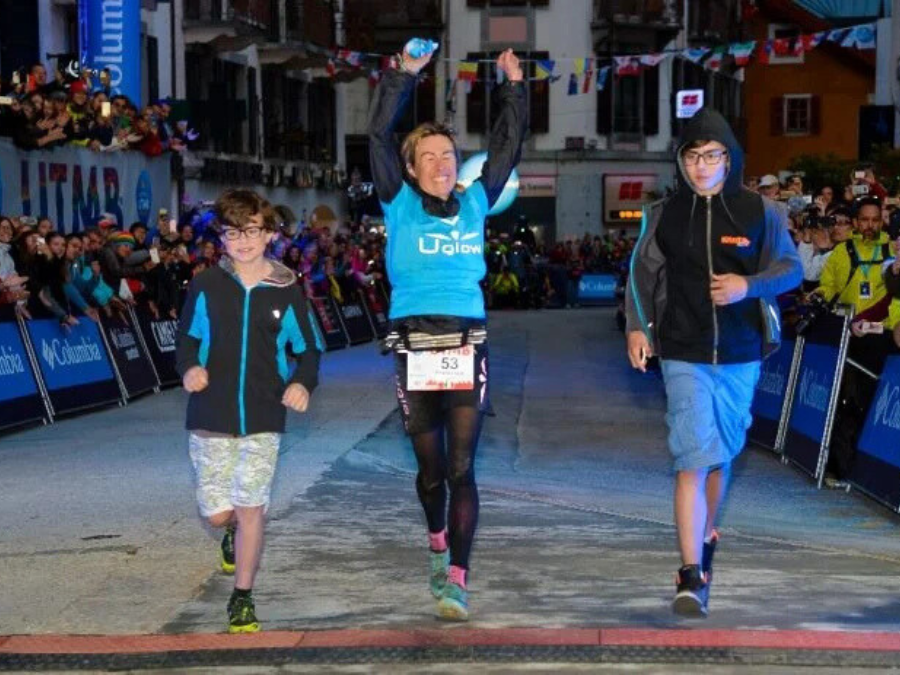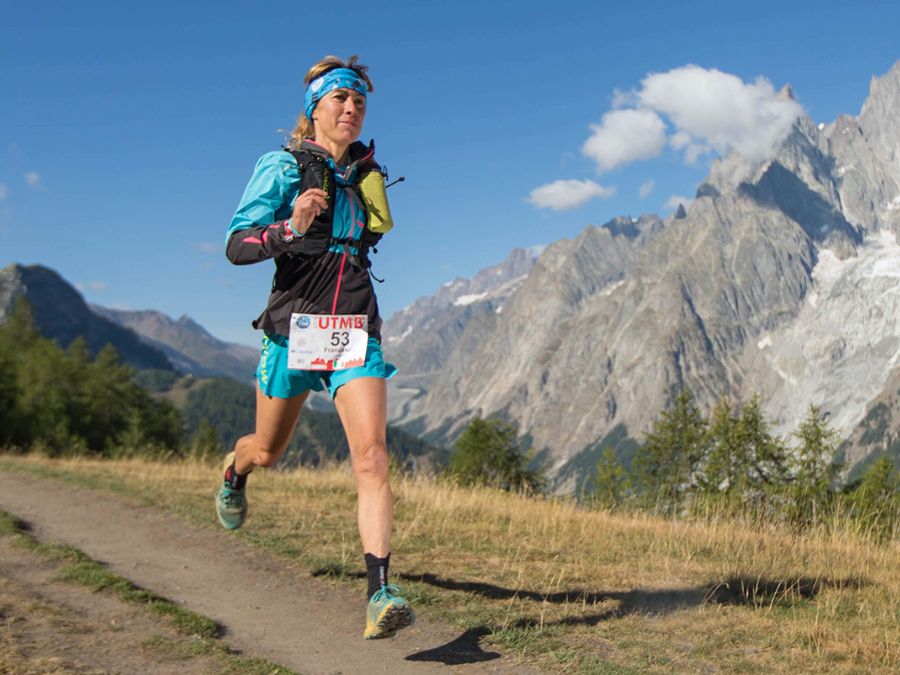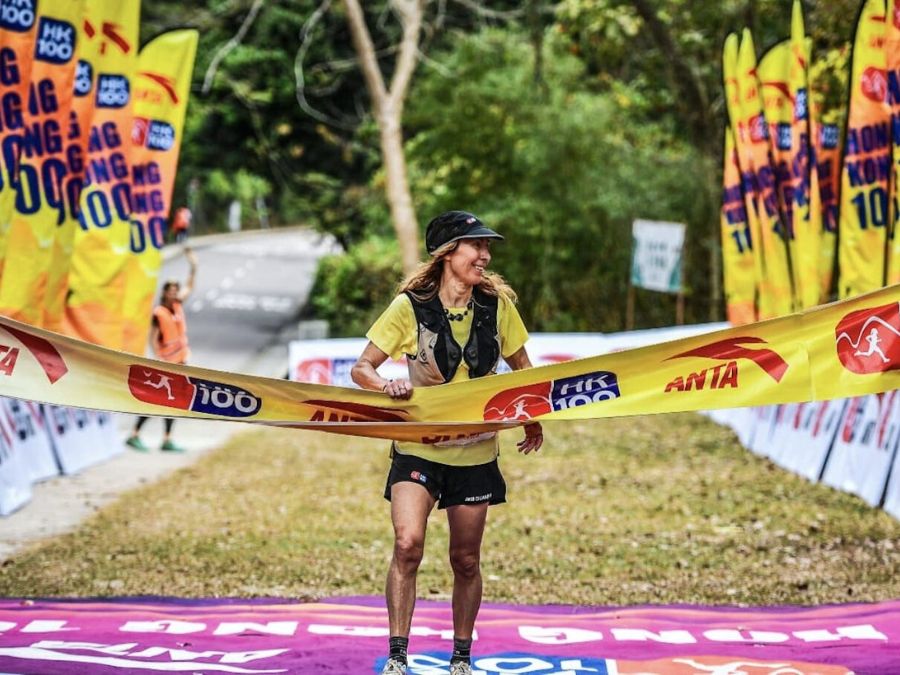In our RT Snap Q&A series, we’ve had the privilege of interviewing some of the world’s best runners, delving into their extraordinary journeys, celebrating their achievements, and exploring the unwavering dedication that defines their careers.
Francesca Canepa
- Born: September 9, 1971
- Nationality: Italian
- Ultramarathons
Francesca Canepa‘s journey into ultrarunning is nothing short of extraordinary. Once a professional snowboarder and later a psychologist, she entered the sport at an age when most elite athletes began to slow down. Despite her late start, Canepa quickly cemented her place among the world’s best ultrarunners. Her first breakthrough came in 2012 when she claimed second place at the Ultra-Trail du Mont-Blanc (UTMB) and followed it just one week later with a victory at the Tor des Géants, a 330-kilometer race in the Italian Alps. This grueling event would become a hallmark of her career, as she returned to win it again in 2013, alongside many World Series wins and podium finishes, showcasing her unmatched endurance and determination.

The pinnacle of Canepa’s career arrived in 2018 when she won the Ultra-Trail du Mont-Blanc (UTMB), widely regarded as the crown jewel of trail running. Covering 170 kilometers around Mont Blanc’s majestic peaks, the UTMB tests even the most seasoned runners. Her triumph in this iconic race was a testament to her mental strength and innovative training methods. Unlike traditional ultrarunners, Canepa avoids high-mileage regimens, opting instead for cross-training and high-intensity interval workouts. Her minimalist approach allows her to maintain peak performance while preserving her physical and mental well-being.
Canepa’s success extends to other prestigious events, such as her victory at the Oman by UTMB in 2018. Known for its punishing technical terrain, this race pushed her to her limits, but she persevered through moments of doubt and exhaustion. Her ability to overcome these challenges stems from her psychological discipline, as she relies on breaking races into manageable sections and focusing on the present moment. Beyond the podium, Canepa’s story inspires many, proving that age, unconventional paths, and self-belief can lead to extraordinary accomplishments.
RT: Your journey into ultra-running is truly inspiring, especially transitioning from elite snowboarding. What initially drew you to endurance sports, and how did you discover your natural talent for long-distance running
Francesca: Thanks so much for this question. I like to talk about snowboarding! The truth is, snowboarding was something I deeply loved because I enjoy speed, I like focusing on perfect technical skills, and I love the excitement of the start and the feeling of smoothly gliding on the snow.
View this post on Instagram
I miss all these things with running because, honestly, I find it somewhat boring compared to gliding sports. However, I was forced to give up snowboarding because of some problems with the Italian Federation, and I felt stuck and lost for a while.
“While” means almost 10 years, during which I grew my kids, completed my degree, but still felt that something was missing.
Then one day, a friend suggested I try a small 26 km trail race. Although I didn’t feel any attraction to running, I finally felt excited to compete again, and unexpectedly, I ranked 3rd.
So, just to check if this could actually be the new sport I was looking for, the next week I tried a marathon (with no training at all except for the previous trail race) and finished easily in 3:29. I decided to give running a try and began entering every race I could find.

Of course, I had to adapt my body, but endurance came naturally to me. I wasn’t tired, and I always felt at ease. But, most importantly, I was grateful for this new opportunity that life had given me. I love and need to compete, so I finally felt at “home” again.
RT: Winning the UTMB in 2018 was a monumental achievement. Can you walk us through what your training looked like in the lead-up to such a high-profile race and how you balanced it with family life?
Francesca: I always assert that winning UTMB is the best gift life has offered me, and I’m always so grateful for that. Especially because, at the very beginning of my running career, I came second in my first attempt in 2012, and I consider winning 6 years later as the main proof of my perseverance and longevity as well.
View this post on Instagram
So, to reply to your question my training is, and has always been, very conservative. 2018 is no exception. I like to train very little between races, mainly with weight lifting and indoor biking, and focus on running only during competitions.
I like to race as much as possible because I’m sort of “lazy,” and I don’t like to go out and run a lot without a purpose. I prefer to train my body like I did with snowboarding and give my best during the competitions. I think that my main quality is being able to stick to a plan and not force myself just because everyone else is doing so. You can verify that if you see my progression through the races. I was 23rd at Contamines, 8th in Courmayeur, 3rd at La Fouly, 2nd at Champex, and 1st in Chamonix.
I’m also very grateful because my body allows me to be the oldest UTMB champion. I’m very proud of that. It means that I found the perfect recipe for me.
View this post on Instagram
RT: Ultra-running often requires not only physical preparation but also mental fortitude. What challenges have you faced throughout your career, and how have you overcome them to stay motivated and resilient?
Francesca: Basically, I think that mental fortitude is key to navigating life in general, but of course, during ultra-running races, it can represent the difference between performing or losing.
I consider ultra running as an endless problem-solving situation because we have to deal with the unexpected, and it’s important to keep calm and stay focused. I normally try to evaluate priorities, check how I really feel organically, see if my motivation is still there, and if not, try to figure out a way to build a new purpose in order to reach the finish line. But I have to say that honestly, if for whatever reason I don’t feel inspired anymore, I prefer to DNF. I don’t like to force my body to endure something I’m not appreciating in the moment. I try to respect myself and accept giving up if I don’t see the point in continuing.
View this post on Instagram
But, as many people may know, the main and worst challenge I had to face was the disqualification at Tor des Géants 2014 because I was accused of being in the car. For sure, I’m not perfect, but I’m honest, and I suffered a lot from the scandal. I couldn’t accept all the lies that everyone was telling and believing. I finally won in court 5 years later because the judge saw the truth, but it was very sad and difficult to face.
My problem was that, as I am and always will be an athlete, I needed to be sure that race organizers were convinced that I was loyal and honest. So I had to ask every time before entering every race, but it was psychologically difficult anyway because I never knew if everyone I met was really sure about me or not.
I had to be strong, aware of who I was, and proud of my values to be able to keep racing. Now I’m actually proud of myself because I fought for myself. After being forced to stop snowboarding, I was determined not to allow anyone or anything to destroy my athlete’s life again.
RT: Nutrition plays a vital role in endurance sports. You’ve mentioned preferring real food during races. Can you share more about how you fuel your body during training and races, and how this strategy has evolved over time?
Francesca: Oh, finally an easy question!! I confirm my preference for real food during races for the very simple reason that I find ultras so demanding in terms of energy, that at least I want to eat something I appreciate and that gives me at least a temporary relief.
So I like proteins like eggs or tuna, pizza, rice, or smashed potatoes with a lot of oil, but the problem, of course, is that when I race abroad, I never know what I will find at aid stations. However, I’m flexible and I can adapt. For sure, I don’t like gels and bars, but I can use them if needed.
View this post on Instagram
In normal life, I like breakfast (especially hotel buffet breakfast) because I love to eat, and during breakfast, I can relax and prepare for the day. So I need time, lots of coffee, and LOTS of food. I keep it simple: I like bread and butter, eggs, croissants, fruits…everything.
Lunch and dinner are balanced as well, with rice, fish, and vegetables.
I think that eating a lot is key to keeping your muscles, bones, and brain strong, and anyway, I like eating, and I firmly support the idea that we need something we enjoy, and food is highly enjoyable.
RT: Balancing a demanding training schedule with being a psychologist, a mother, and a dog owner must be challenging. How do you manage your time effectively to ensure you’re giving your best in every area of life?
Francesca: I like managing, as it represents another opportunity for problem-solving! But to be honest, it’s not so hard for me because:
View this post on Instagram
• My dog runs with me if I run, and if not, she just needs 2 walks a day, so it’s not too demanding.
• My younger kid is at school.
• My older kid is an athlete as well (Italian National Snowboarding Team), so he trains or recovers on the couch (exactly as I do).
• I see patients in the afternoon if needed, but I don’t work so much as a psychologist. I prefer to focus on training my son through video sessions or athletic training with him, and on the slopes in winter.
Anyway, I think that everything is possible if we get organized.
As I never train more than 1 hour 30 minutes, I have time to do everything.
The problem may be when I leave for races, but my parents always support us, so I’m very grateful for that.
RT: You’ve achieved so much in your career, from UTMB to other prestigious races. What goals are you working towards now, and what keeps you excited about the sport of ultra-running?
Francesca: This is my favorite question because it provides me with the opportunity to share my thoughts, and I hope in a deep way. Yes, I have had some great achievements in my life, but as life goes on, I feel the need to go further, to not just race and go home.
Now my main purpose is to empower people through my racing. I want to inspire people and help them follow their dreams or goals.
View this post on Instagram
I would like to help as many people as possible crush all the stupid limitations that society imposes, like “you are too old,” for example. I have been fighting against “Too Old” comments since I was 12, with figure skating, and then with snowboarding. Enough is enough.
So now I want to inspire through my example: I keep going, I keep racing, I keep improving myself in all areas of life, and this is possible for everyone. The endless quest for improvement is what can switch a normal life to a special life, and there is a big difference.
I hope to be able to inspire people to just believe, follow their souls, and commit to whatever they aim to achieve.
View this post on Instagram
RT: For aspiring runners who dream of tackling ultra-endurance events, what advice would you offer about starting their journey, building confidence, and staying consistent despite setbacks?
Francesca: I think the best advice I could give is to first establish your WHY.
When someone is fully aware of the real reason why they want to do something, the HOW will appear by itself.
Ultra running is highly demanding for both the mind and body, so it’s important to know the reason that pushes us to endure it. Being aware of this will help in difficult times because it allows us to find some more energy, reminds us of our passion, and helps us be proud of ourselves knowing all the progress we’ve made since the beginning.
View this post on Instagram
Working on the mindset is key. But working on and respecting the body is key as well, because we have to take care of all the cells that allow us to move in such an extreme way. So, rest a lot, eat enough, work in the gym, stretch, and enjoy!
Trying to feel joy is something nobody talks about, but in my opinion, it’s very important.
I think joy is the real goal, and it’s great to feel it as much as possible. Not just in running.




